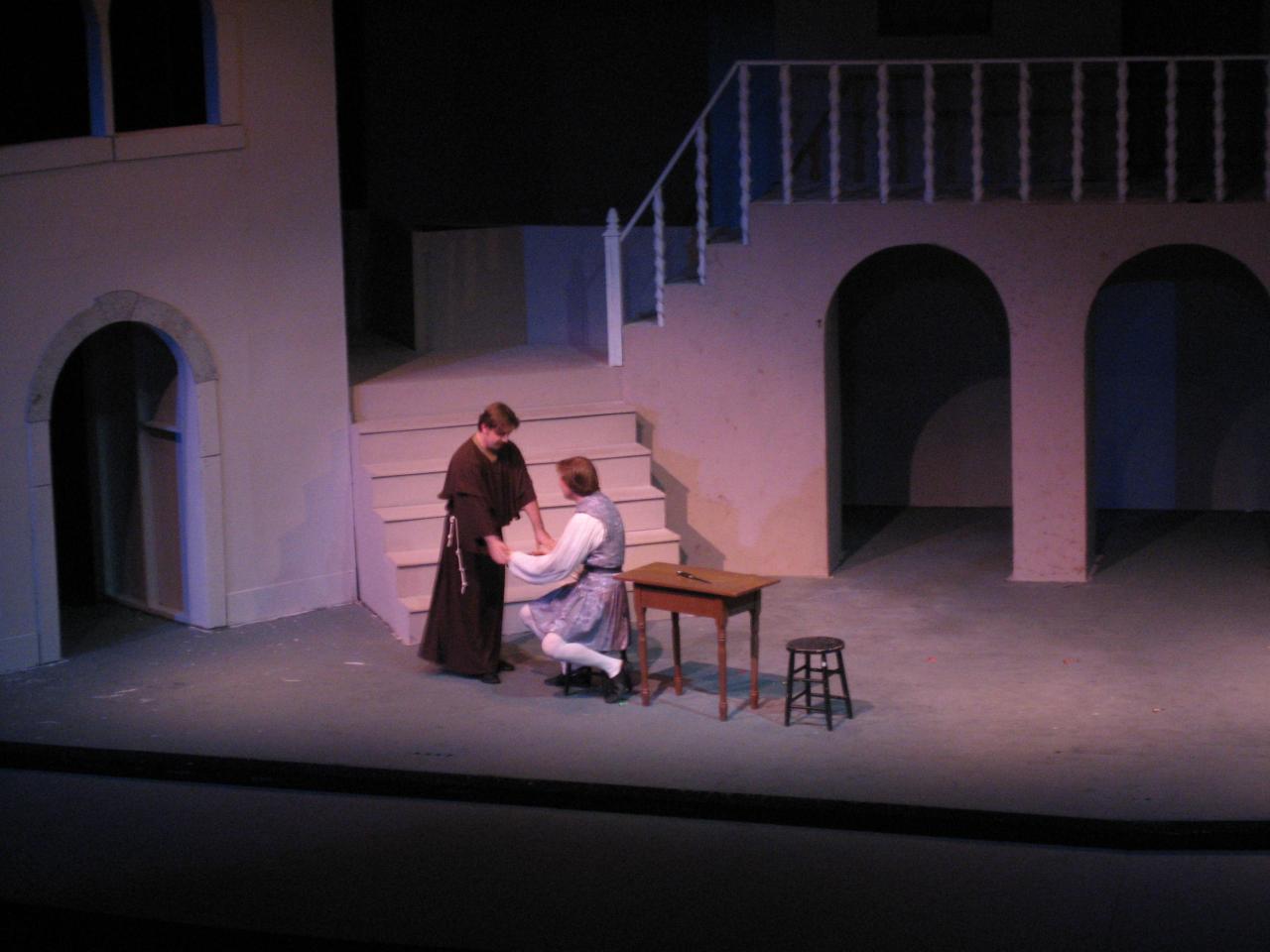External Obstacles Preventing Friar Laurence

Friar Laurence’s well-intentioned plan to unite Romeo and Juliet and end the feud between their families is thwarted by a series of unfortunate external events and Romeo’s impulsive actions. These obstacles, combined with elements of chance and fate, ultimately lead to the tragic demise of the young lovers. The Friar’s meticulously crafted scheme unravels due to factors beyond his control and the unpredictable nature of human behavior.
Romeo’s Hasty Actions
Romeo’s rash decision-making significantly undermines Friar Laurence’s carefully laid plans. His impulsive killing of Tybalt, Juliet’s cousin, throws the entire situation into chaos. This act of violence forces Romeo into exile, a crucial event that disrupts the timing of the Friar’s carefully orchestrated sequence of events designed to reunite the lovers. The exile creates a significant communication barrier, preventing the Friar from delivering crucial information to Romeo and ultimately contributing to the tragic misunderstanding that seals Juliet’s fate. Romeo’s hasty actions, driven by passion and grief, are a primary external factor preventing the Friar from successfully implementing his plan.
The Role of Fate and Chance
The play suggests a strong element of fate or chance influencing the outcome. Several seemingly minor incidents conspire to prevent the Friar’s message from reaching Romeo. The messenger’s delay in delivering the crucial letter explaining Juliet’s feigned death is a pivotal example. This delay, a matter of chance or bad luck, is directly responsible for Romeo’s ignorance of the truth and his subsequent actions. Similarly, the timing of Romeo’s arrival at the tomb, coinciding with Juliet’s awakening, is another instance where fate plays a significant role. These instances of chance highlight how external factors, outside of the Friar’s control, contribute to the tragedy.
External Events Disrupting Friar Laurence’s Plan
Several external events conspire against Friar Laurence’s efforts. The swift escalation of violence following Tybalt’s death creates a climate of fear and suspicion, making communication and travel increasingly difficult. The Prince’s decree of banishment for Romeo creates an immediate and insurmountable obstacle to the Friar’s plan, making it nearly impossible to execute the planned union between Romeo and Juliet. Furthermore, the unpredictable nature of the Capulet and Montague feud, with its potential for further violence, adds another layer of external pressure, making the implementation of the Friar’s delicate plan even more challenging.
Comparison of External Obstacles
| Obstacle | Description | Impact on Friar Laurence’s Plan |
|---|---|---|
| Romeo’s killing of Tybalt | Romeo impulsively kills Tybalt, leading to his banishment. | Creates a major communication barrier and disrupts the timing of the plan. |
| The Messenger’s Delay | The messenger fails to deliver Friar Laurence’s letter to Romeo in time. | Leaves Romeo unaware of Juliet’s feigned death, leading to his tragic decision. |
| Romeo’s Banishment | The Prince exiles Romeo from Verona, separating him from Juliet. | Makes it extremely difficult for the Friar to execute his plan. |
| The Escalation of the Feud | The ongoing feud between the Capulets and Montagues creates a volatile environment. | Increases the risk and difficulty of communication and travel. |
The Messenger’s Failure

Friar Laurence’s plan hinges on a crucial message reaching Romeo, informing him of Juliet’s feigned death and the subsequent plan for their reunion. The messenger’s role is paramount; he is the sole link connecting Friar Laurence’s carefully constructed scheme to its intended recipient. His failure to deliver the message unravels the entire plan, leading to the tragic climax of the play.
The messenger’s failure stems from the disruption caused by the plague. The city is gripped by a severe outbreak, resulting in quarantines and travel restrictions. This unforeseen circumstance prevents the messenger from reaching Romeo, effectively severing communication between the Friar and his intended recipient. The messenger’s inability to navigate the chaotic and dangerous conditions caused by the plague is the pivotal reason for the message’s non-delivery. This failure is not due to negligence or malice, but rather the overwhelming power of an external, uncontrollable force.
Consequences of the Messenger’s Failure, How is friar laurence prevented from fulfilling the law
The consequences of the messenger’s failure are catastrophic. Romeo, unaware of Juliet’s feigned death, believes his beloved to be truly deceased. Overwhelmed by grief and despair, he makes the rash decision to end his life beside Juliet’s tomb. This act, directly resulting from the lack of communication facilitated by the messenger’s failure, leads to the deaths of both Romeo and Juliet, rendering Friar Laurence’s intricate plan futile and tragically ironic. The chain of events underscores the fragility of plans when faced with unpredictable external forces.
A Successful Message Delivery Scenario
Imagine a scenario where the plague is less severe, or perhaps the messenger finds a creative workaround – perhaps a trusted friend outside the quarantine zone relays the message. Romeo, upon receiving the letter, rushes to Juliet’s side, just as she awakens from her drug-induced slumber. The lovers reunite, escaping the tragic fate that befell them in the original narrative. Friar Laurence’s plan succeeds, and the lovers are able to leave Verona, starting a new life together, free from the family feud that threatened their happiness. This alternate outcome highlights the pivotal role of communication and the butterfly effect of seemingly small events. The absence of the plague, or the success of alternative communication methods, drastically alters the story’s trajectory, transforming tragedy into a triumphant resolution.
The Role of Communication Breakdown: How Is Friar Laurence Prevented From Fulfilling The Law

Friar Laurence’s well-intentioned plan to unite Romeo and Juliet ultimately fails due to a series of critical communication breakdowns. These failures, stemming from both a lack of direct communication and a pervasive mistrust between characters, create a domino effect that leads to the tragic deaths of the young lovers. The absence of clear, timely, and reliable information significantly undermines the Friar’s efforts and exacerbates the already volatile situation.
The miscommunication and lack of trust are key elements contributing to the play’s tragic conclusion. Several instances demonstrate how better communication could have altered the course of events, preventing the disastrous outcome. Examining these failures reveals the fragility of the Friar’s plan and highlights the devastating consequences of ineffective communication in high-stakes situations.
Instances of Miscommunication Contributing to the Tragedy
Several instances of miscommunication directly contribute to the play’s tragic denouement. Firstly, Romeo’s hasty decision to kill Tybalt is partly fueled by a lack of complete information. He is unaware of the Prince’s decree regarding further violence, nor does he fully grasp the extent of the feud’s ramifications. Had Romeo been better informed and communicated with Friar Laurence before acting, he might have avoided exile and the ensuing chain of events. Secondly, Juliet’s desperate situation remains largely unknown to Romeo until it is too late. The delay in receiving news of her supposed death directly contributes to his suicide. Finally, Friar John’s failure to deliver Friar Laurence’s letter to Romeo represents a crucial communication breakdown that leaves Romeo without vital information, leading to his tragic demise.
Alternative Communication Strategies and their Potential Impact
Had Friar Laurence implemented different communication strategies, the outcome might have been vastly different. For example, he could have entrusted multiple messengers with the letter to Romeo, creating a backup plan to ensure delivery. Alternatively, he could have arranged for a more reliable method of communication, perhaps using a trusted servant or even travelling to Mantua himself to ensure Romeo received the crucial message. Furthermore, open and honest communication between Romeo and Juliet, particularly regarding the challenges of their secret marriage and the escalating feud, might have prevented impulsive actions driven by misinformation or a lack of understanding. Open communication between the families, while challenging, might have also eased tensions and prevented the initial escalation of violence.
Timeline of Communication Failures Hampering Friar Laurence’s Plan
A timeline illustrates how communication failures progressively undermined Friar Laurence’s plan:
- Romeo kills Tybalt (Act 3, Scene 1): The immediate consequence is Romeo’s banishment, preventing direct communication with Juliet.
- Friar Laurence devises the plan (Act 4, Scene 1): The plan relies heavily on the timely delivery of information, which proves problematic.
- Friar John is quarantined (Act 5, Scene 2): This prevents the delivery of the crucial letter to Romeo, a catastrophic communication failure.
- Juliet drinks the potion (Act 4, Scene 3): This action, while part of the plan, creates a new layer of miscommunication due to the lack of communication between Romeo and Juliet regarding the specifics of the plan.
- Romeo hears of Juliet’s death (Act 5, Scene 1): This news, delivered without the crucial context of the plan, precipitates Romeo’s suicide.
Lack of Trust Affecting the Execution of Friar Laurence’s Plan
The lack of trust between characters significantly hampered the execution of Friar Laurence’s plan. Romeo’s impulsive nature and his distrust of the Friar’s ability to resolve the situation contribute to his rash actions. Juliet’s trust in the Friar, while strong, is tested by the unfolding events and the absence of communication from Romeo. The lack of trust between the Montagues and Capulets makes any reconciliation impossible, preventing a resolution that might have saved the lovers. The overall lack of trust between all involved parties, stemming from years of hatred and mistrust, ultimately creates an environment ripe for miscommunication and tragic consequences.

Tim Redaksi